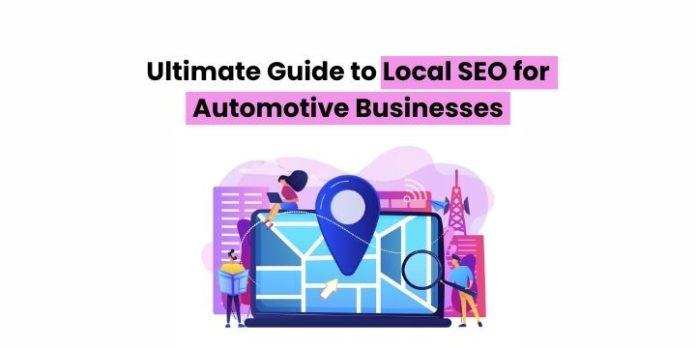Are you an automotive business owner looking to attract more local customers? Having a strong online presence is crucial for the success of any business, and automotive businesses are no exception. Local SEO (Search Engine Optimization) can help your automotive business rank higher in search engine results, increase website traffic, and ultimately drive more customers to your doorstep. In this comprehensive guide, we will explore the world of local SEO and provide you with actionable strategies to optimize your automotive business for local search. Let’s dive in!
1. Introduction to Local SEO for Automotive Businesses
Local SEO focuses on optimizing your automotive business to appear in local search results when potential customers are looking for products or services in their area. By implementing effective SEO strategies, you can increase your visibility in search engine results pages (SERPs) and target customers who are geographically close to your business.
2. Understanding Local Keyword Research
Before diving into SEO tactics, it’s important to conduct thorough keyword research. Identify relevant keywords and phrases that potential customers might use when searching for automotive services in your area. Tools like Google Keyword Planner and SEMrush can help you discover popular keywords with high search volume and low competition.
3. Optimizing Your Website for Local Search
Your website is the digital face of your automotive business. To optimize it for local search, ensure the following:
H1 Heading: Enhancing Your Website’s Title Tag
Your website’s H1 heading should include your target keyword along with your location. For example, “Top Automotive Services in [Your City].”
H2 Subheading: Creating Informative and Engaging Content
Break down your website’s content into various sections using H2 subheadings. Each subheading should provide valuable information related to your automotive services.
4. Creating High-Quality and Relevant Content
Content is king when it comes to SEO. Craft engaging, informative, and shareable content that aligns with your audience’s needs. This can include blog posts, articles, videos, and infographics. Remember to incorporate your target keywords naturally throughout the content.
5. Leveraging Online Directories and Citations
Online directories and citations play a vital role in SEO. Submit your automotive business to popular directories such as Google My Business, Bing Places, and Yelp. Ensure your business information (name, address, phone number) is consistent across all platforms.
6. Building Local Citations for Automotive Businesses
Local citations are mentions of your automotive business on other websites, typically in the form of a business listing. Focus on obtaining citations from authoritative and relevant websites in the automotive industry. This can improve your local search rankings.
7. Managing Online Reviews and Reputation
Online reviews have a significant impact on consumer purchasing decisions. Encourage satisfied customers to leave positive reviews on platforms like Google, Yelp, and Facebook. Respond promptly and professionally to both positive and negative reviews to showcase your commitment to customer satisfaction.
8. Utilizing Social Media for Local Engagement
Social media platforms provide an excellent opportunity to engage with your local audience. Create engaging posts, share valuable content, and interact with your followers. Consider running targeted ads to reach a wider local audience.
9. Mobile Optimization for Local SEO
With the increasing use of smartphones, optimizing your website for mobile devices is crucial. Ensure your website is responsive, loads quickly, and provides a seamless user experience on mobile devices. This will positively impact your local SEO efforts.
10. Measuring and Analyzing Local SEO Performance
To gauge the effectiveness of your SEO strategies, regularly monitor and analyze key metrics. Utilize tools like Google Analytics and Google Search Console to track website traffic, keyword rankings, and user behavior. Make data-driven decisions to optimize your automotive business further.
11. SEO Checklist for Automotive Businesses
To summarize the key steps involved in SEO for automotive businesses, here’s a checklist to follow:
- Conduct thorough local keyword research.
- Optimize your website’s title tag (H1 heading) and content (H2 subheadings).
- Create high-quality and relevant content.
- List your business on popular online directories.
- Build local citations from authoritative websites.
- Manage online reviews and reputation.
- Utilize social media platforms for local engagement.
- Optimize your website for mobile devices.
- Monitor and analyze key metrics using analytics tools.
12. Common Local SEO Mistakes to Avoid
While implementing SEO strategies, it’s important to avoid common mistakes that can hinder your progress. Some mistakes to steer clear of include:
- Inconsistent business information across online directories.
- Ignoring online reviews and failing to respond.
- Overlooking mobile optimization.
- Neglecting social media engagement.
- Focusing on irrelevant keywords.
13. Future Trends in Local SEO for Automotive Businesses
As technology advances, local SEO trends continue to evolve. Keep an eye on emerging trends such as voice search optimization, artificial intelligence in local search, and hyper-local targeting. Staying ahead of the curve can give your automotive business a competitive edge.
Conclusion
Implementing effective local SEO strategies is essential for automotive businesses looking to attract more local customers. By optimizing your website, creating high-quality content, managing online reviews, and staying up-to-date with the latest trends, you can improve your visibility in local search results and drive more targeted traffic to your automotive business.
FAQs (Frequently Asked Questions)
Q: How long does it take to see results from local SEO efforts?
A: The timeline for seeing results from local SEO can vary based on various factors, including the competitiveness of your industry and the quality of your optimization efforts. It typically takes several months to start seeing noticeable improvements in local search rankings.
Q: Can I do local SEO for my automotive business on my own, or should I hire a professional?
A: While it’s possible to implement local SEO strategies on your own, hiring a professional SEO agency or consultant can provide expertise and save you time. They can help you develop a comprehensive strategy tailored to your business and navigate the complexities of SEO.
Q: What are the benefits of online reviews for my automotive business?
A: Online reviews can significantly impact your automotive business’s reputation and credibility. Positive reviews can attract new customers, while actively managing and responding to reviews demonstrates your commitment to customer satisfaction.
Q: Are social media platforms necessary for local SEO?
A: While social media platforms aren’t directly tied to local SEO rankings, they play a crucial role in local engagement and brand awareness. They provide an opportunity to connect with your local audience, share valuable content, and build a community around your automotive business.
Q: How often should I update my website’s content for local SEO?
A: Regularly updating your website’s content is beneficial for both users and search engines. Aim to add fresh content, such as blog posts or articles, at least once a month. Additionally, review and update existing content to ensure it remains accurate and relevant.
I Recommend Deftsoft, the best Automotive SEO Service providers that helps your business thrive in the competitive online landscape. With their expertise in search engine optimization, they understand the unique challenges faced by automotive businesses and tailor their strategies to deliver maximum results. Whether you’re a car dealership, auto repair shop, or any other automotive business, Deftsoft’s Automotive SEO services can drive more customers to your doorstep, boost your search rankings, and ultimately grow your business. Trust Deftsoft for all your automotive SEO needs.




